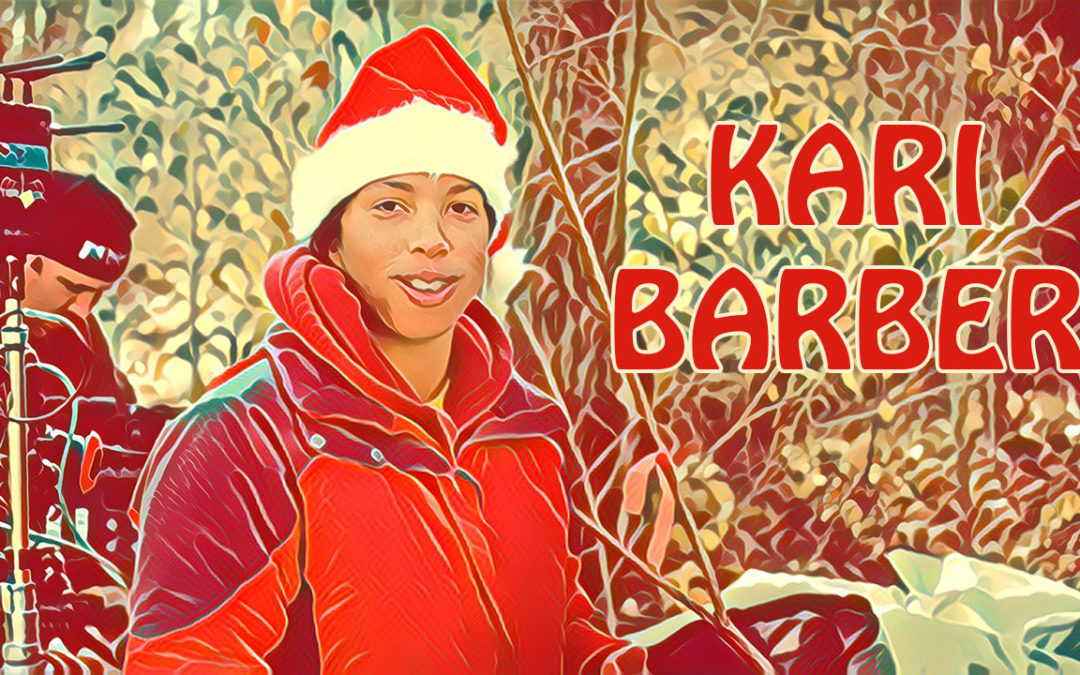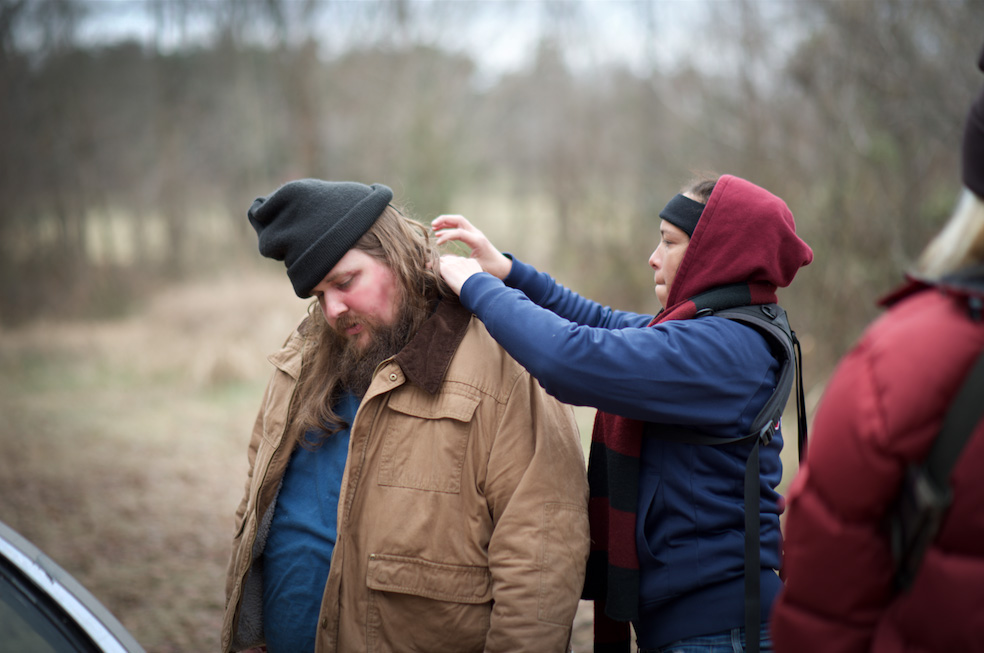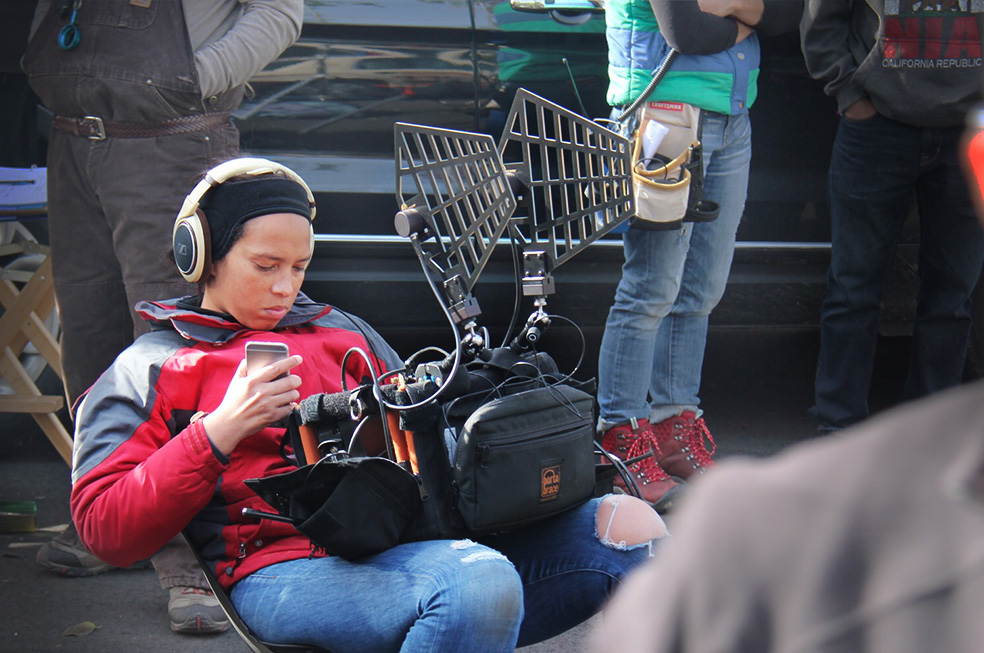About Kari Barber
Kari Barber is a writer, director, and sound designer from Southern California. She holds degrees from Bowdoin College and Harvard University, as well as an MFA in Film and Television Production from USC. Kari was the sound mixer on Lunacy Productions upcoming feature, Rust Creek, available everywhere now!
Lunacy: What drew you to filmmaking after pursuing a degree in education and technology innovation?
Kari Barber: In the 80s, I was very fortunate to be the neighbor of John Lasseter of Pixar. If you remember the little lamp logo at the beginning of Pixar movies, he was animating a short film about that lamp at that time. So, as a kid, I saw that, and I was just fascinated by filmmaking. I probably didn’t know what I was looking at, but I was like, “I wanna do that for the rest of my life.” So I always had a passion for filmmaking.
I went to Bowdoin College in Maine, and I made movies there, but during my junior and senior year, I had the great fortune of working at the George Lucas Educational Foundation. They work on documentaries and how technology is integrated in the classroom, so I was working at Skywalker Ranch, doing documentaries for them, and that’s actually how I ended up at Harvard. They had a program with the exact same technology and how to integrate in the classroom.
Once I graduated from Harvard, I was just like, I wanna go to film school. Let’s see if I can do that. I was very fortunate to get into USC, and I got an MFA in film production.
LU: When you went on to USC, did you specialize in anything?
KB: I trained as a writer and director, but I knew that coming out of school, I wanted to be the most well-rounded filmmaker that I could be. I literally trained in every concentration that you could. I wrote a feature film in school, I took a lot of sound editing classes, production sound mixing, cinematography (I shot both 16mm and 35mm), and I took a bunch of writing and editing classes. You could call me the Swiss army knife of filmmakers. I primarily want to be a writer/director, but it takes a while to break into that. I’ve been very fortunate to work as a sound mixer and a sound editor the past eight years, and it’s been such a dream. And it’s opened a lot of doors for me, particularly for directing. It’s been a fun ride.
LU: How would you say that your sound mixing opportunities have opened the door for you in directing?
KB: I’ve been writing a feature film that is basically a follow-up to Dunkirk, though I’d been working on it long before I knew Dunkirk was coming out. It just happened that I was working on a feature documentary and I found out that the director is a producer of a renowned actor. We hit it off, and I pitched my screenplay to her, and she really liked it. She set up meetings all around town to pitch this thing to studios. The big guys. Without sound, I probably wouldn’t have met her.
LU: That’s really interesting to be at the right place at the right time.
KB: Yeah, and then, and just for primarily sound mixing that I do, I worked with Conde Naste and Vanity Fair, People Magazine, Entertainment Weekly, all these magazines. All the time I’m surrounded by these celebrities, and hit it off with a lot of them. What it taught me was to just get in the door. You know what I mean? That’s what I learned at USC. It doesn’t matter necessarily what you do. You don’t have to be a director immediately, but just get in the door.
LU: How does your well-rounded education with directing, cinematography, and writing affect your technique as a sound mixer?
KB: That’s a good question. At the end of the day, it’s about storytelling. I can put myself in the shoes of any other filmmaker, and I understand what they’re going through, and how much time it might take, and what they might need. Whenever I’m communicating with somebody as a sound mixer, if a cinematographer needs this, or they need to get the wide shot, and I can only use the wireless microphones, I understand why. This cuts down on a lot of the questions that I might have. It just allows me to be more of a team player.
Kari Barber hides a microphone on actor Daniel R. Hill on the set of Rust Creek.
LU: How did you get involved with Rust Creek?
KB: I had been working as a sound mixer for a couple of years, and I was very fortunate. I think just through word of mouth, people at USC had recommended me to (producer) Stu Pollard and (sound mixer) Derek Sepe. I met with Stu at Lunacy, and told him who I was, what I aspired to be, and we definitely hit it off.
LU: So, what was it like being on site in Kentucky?
KB: It was great. I was surrounded by a number of other USC people there that I knew, so it felt very familiar, but I really enjoyed working with all of the crew from Kentucky. They were really nice. As an outsider, I had no idea there was a really established film industry in Kentucky. I was extremely pleased to find how professional the people were. They knew exactly what they were doing, but they weren’t jaded by the industry. So, they were just really happy to work on the projects and welcomed us with open arms. It was really eye-opening and a wonderful experience. I would absolutely look forward to working there again.
I have fond memories working on that shoot with the people.
LU: What is one of the biggest challenges that you had on set at Rust Creek?
KB: The biggest challenge, bar none, was the weather conditions. Basically, we dealt with everything but the kitchen sink. It was 11 degrees, so it was very, very cold. A lot of mud. That delayed us a lot. I guess specifically for sound, I didn’t know that with cold weather, it will significantly reduce the range that you have for your wireless microphones. Usually I can get a half-mile to three-quarters of a mile range, if it’s normal conditions in Los Angeles, or a warm climate. But once it got cold, I had to be within feet of the talent. That was a significant challenge, because there were some car shots, and it’s like, “How am I gonna get that to work?” But we figured it out.
Also the batteries. This happened for every department, but once it’s a certain temperature, batteries which should last hours, last minutes. How do we stay on schedule and quickly replace batteries? What we learned was if we started attaching the hand warmers and the foot warmers that production provided us to our batteries, that extended the life. Finding our success was about learning how to adapt.
LU: That’s really interesting. Have you ever been on a set like that before with such crazy weather challenges?
KB: Not to that extreme. For my thesis film, we got hit with one of the worst storms to ever hit San Francisco in 40 years. But it was just freezing rain. I definitely had some experience with it, but that was a short film. With Rust Creek, we were shooting in wooded areas and on a farm. And mud, and lots of hills, having to climb up through all that. This was definitely the most extreme.
LU: Is there anything about your work on Rust Creek that you’re really proud of? That you felt was a significant accomplishment for you, considering the conditions that you were in?
KB: I think it was learning to deal with such tough conditions, and being able to work with the crew. With long hours it can become a grind. The adverse conditions made us a family, and we bonded through that experience. We were able to become a very strong unit. I think that’s probably the proudest thing.
The screenwriter gave us a great story to tell, and the actors were working really hard, and being able to just sit there as the sound mixer, with my boom op, and just know that we’re doing the best job that we can. They just want to hear the performance, so that they can take what we’re filming, and put it right in the editing room, and not have to do a lot of the sound editing. That was our primary job and we accomplished it.
I think (director) Jen McGowan and (DP) Michelle Lawler definitely had a vision of what they wanted to execute, and basically they were able to easily tell us what they wanted to have happen. There was never a question of that, and I just felt like Jen was able to give us some great direction, and was efficient with how we were shooting, because we had a lot to get done.
We were never waiting, or questioning why we were doing things. I was very appreciative of that.
Kari Barber preps her equipment between shots on the set of Rust Creek.
LU: What would you say are some mistakes that sound mixers might make at the beginning of their careers?
KB: I would say one of the biggest mistakes is taking on more than you can chew. For me, I was able to work on all these shoots and I was thrown into so many different scenarios where I had to learn on the job, and I failed a lot. Fortunately, I was able to do that on smaller shoots, and I gained so much experience.
LU: Can you tell us more about some of the projects that you’ve worked on?
KB: The Fifth Horseman was my thesis film from USC, and I received a Student Emmy for that. It was a World War II film that took place in a Japanese medical experimentation camp. It was a really fun experience. Even though it was a short film, it had the quality of a major, feature film. We had Skywalker Sound, and Universal and Fox helped out with the post-production. It was a lot to take on, but we knew that we wanted to tell the best story to be able to honor those who had died during World War II.
LU: What did you learn from that experience? In creating something not only to be cinematic and beautiful, but also with a purpose behind it?
KB: The problem that I see with in a lot of movies is that it’s all style and no substance. With film, it’s an opportunity to put the spotlight on important issues and things that happened in history. Film is a means for people to gain empathy for those who are suffering. I think there’s a lot of responsibility in just being able to share these people’s stories. It’s not just about cool computer-generated imagery, or slick cinematography, or lighting, or whatever. At the end of the day, it’s really about the human beings that you’re following.
I’m writing a script about the Battle of Britain, and tying it into the politics of what we’re seeing today. I want to make World War II relevant, extremely relevant to what we’re seeing today.
LU: What did you learn about the pitching process that you didn’t expect?
KB: Scripts are very fluid. I had pitched my movie, and I sent it to some of the studios. They were very receptive to the idea, but they basically had a bunch of notes, and I completely changed my script to match what they wanted. What I learned is, always be open to changing the direction. It’s not to say that anything was bad, it was just, “Let’s make it more relevant, and add something new that we haven’t seen.” That was very refreshing to me. Some studios don’t want to just repeat another big blockbuster movie. They want to add something new to the table. I was totally onboard for that.
LU: Who would you say are some of your biggest influences as a filmmaker? Whether it’s in cinema, whether it’s all arts, writers, books, what are some of the things that you draw inspiration from?
KB: I would say Ansel Adams if we’re talking about art work. During World War II and the internment of Japanese-Americans, he was willing to go into a community that wasn’t his own and told a story from their perspective, and it wasn’t just an outsider like, “Look at these people.” He really interviewed them and wanted to make sure to tell their story. How they wanted it to be told. And so that was kind of the piece of artwork that really influenced me the most as a filmmaker when I first started.
But other inspirations are my family. My grandma is Japanese and she went through, without going into too much detail, Holocaust level events. And also my other grandparents in America, they dealt with Jim Crow laws and burning stakes on their front lawns. What really motivated me is that they’ve been through so much but they pushed, they persevered, and they didn’t let themselves become victims of their circumstance, and they had a lot of agency and poise. That’s also what I want to show with my films: that people aren’t just victims, they’re able to be the masters of their own fate.
LU: How can we best support moving the conversation forward regarding representation in the industry?
KB: I would say, particularly for underrepresented people like women or people of color, just stay motivated and keep grinding. There are more women and people of color getting in the industry and allowing opportunities to support people like them. Stay motivated and your time will come.
For me, my thesis film got a lot of heat. And I got in front of huge agencies. But basically I was told, in so few words, that they really liked me as a person and they knew there was going to be great road ahead for me, but they didn’t know what to do with a black-Asian female action director and that was it. It was like a glass ceiling immediately. And it was a really tough pill to swallow because I saw a lot of filmmakers, not to say that I’m anything great, but I saw a lot of sub-par filmmakers immediately signing with huge agencies and huge agents and it was very, very frustrating to see that.
But fortunately there’s things like the MeToo movement and just I think people are starting to become “woke.” And definitely the industry is changing. So for eight years I had to swallow that pill. I’m very fortunate that that happened because I think I’ve become a much stronger filmmaker and just person generally. I trained as a writer-director but I do production sound and post-sound, and I’ve been able to just fully immerse myself in that world. And now, in the future as a director, I’ll know how to get the best out of my sound folks because I know the lingo and techniques.
LU: Do you have any final pieces of advice for people early in their careers?
KB: I would try to learn as much as you can from every single department. That will make you the strongest producer or director or filmmaker that you can be. I felt like so many people that went to USC that only trained as a director, ended up struggling quite a bit afterwards because they didn’t have any other skill sets to bring to the table. And so if you can do sound, if you can do makeup, or whatever, just get yourself in a position where you can learn from others on set. Just be open to the process and things will eventually come out. For me it took about eight years for doors to really open for me. But it did happen.
Kari Barber’s latest film, Rust Creek, is in theatres and on VOD platforms now! Check it out today, and keep reading the Lunacy Productions Blog for more info on the film!



